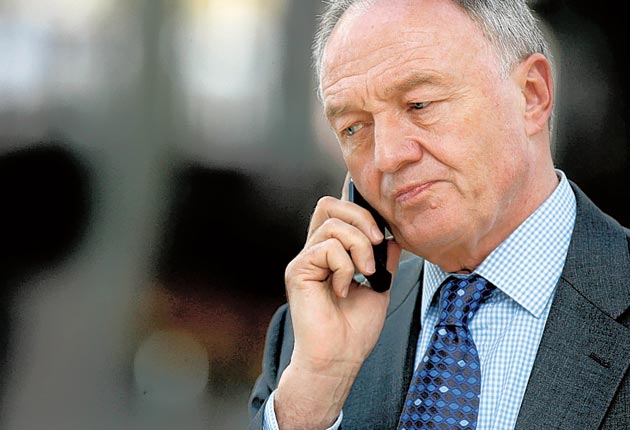Ken Livingstone to ask Yard if he was victim of hacking

Your support helps us to tell the story
From reproductive rights to climate change to Big Tech, The Independent is on the ground when the story is developing. Whether it's investigating the financials of Elon Musk's pro-Trump PAC or producing our latest documentary, 'The A Word', which shines a light on the American women fighting for reproductive rights, we know how important it is to parse out the facts from the messaging.
At such a critical moment in US history, we need reporters on the ground. Your donation allows us to keep sending journalists to speak to both sides of the story.
The Independent is trusted by Americans across the entire political spectrum. And unlike many other quality news outlets, we choose not to lock Americans out of our reporting and analysis with paywalls. We believe quality journalism should be available to everyone, paid for by those who can afford it.
Your support makes all the difference.The former mayor of London, Ken Livingstone, yesterday became the latest public figure to suggest that he is a victim of phone-hacking by News of the World journalists. He is writing to the Metropolitan Police to ask whether his details were on the list of names seized by officers who arrested Glenn Mulcaire and Clive Goodman, the private investigator and tabloid reporter jailed for phone-hacking in 2007.
If it transpires that Mr Livingstone's details were held by Mr Mulcaire or that his mobile phone voicemails were hacked it will raise further questions about the criteria Scotland Yard used when deciding which of the 4,332 potential victims they would alert to the possible criminal activity against them.
Brian Paddick, the former Scotland Yard deputy assistant commissioner, and the MP Chris Bryant have already expressed outrage because they were told Mr Mulcaire held their details only after approaching the force with a request.
Mr Livingstone decided to contact Scotland Yard after discovering that he was the victim of a "blag" by the private detective Steve Whittamore. Mr Whittamore, or someone working with him, illegally obtained Mr Livingstone's address from a telephone company. It is suggested that the information was then sold to a News International title.
Although Mr Whittamore was convicted in 2005, Mr Livingstone said it was only recently that he had become aware he was a victim. He added: "It is a cause of great concern to me that I appear to have been the subject of a 'blag' in the Whittamore/News International activities, not least because it then inevitably raises the question of whether I was similarly targeted by News of the World as part of the Glenn Mulcaire and Clive Goodman case. I am considering my options."
The Independent understands that Mr Livingstone will contact detectives next week in his attempt to discover whether he was a victim of Mr Mulcaire and Mr Goodman.
Mr Mulcaire has hired the London-based literary agent Robert Smith as a media adviser as he prepares to speak publicly for the first time about the extent of his hacking. He said: "I do not particularly think that Mr Mulcaire should partake in any debate which centres around what should happen to Andy Coulson. To Mr Mulcaire's credit he has not said anything for the past four years, but I think the time will come when this will change."
Mr Mulcaire signed an £80,000 confidentiality agreement as part of the termination of his £104,000 contract with the News of the World, but this would not prevent him giving evidence should he be compelled by the Commons Standards and Privileges Committee into phone hacking, announced this week.
Channel 4 has reported claims that MPs sitting on the 2007 Culture and Media Select Committee had pulled back from forcing the then editor of The Sun, Rebekah Brooks (then Wade), to testify for fear that their personal lives would be investigated as a consequence.
The channel said four MPs on the committee wanted to ask the Serjeant-at-Arms, the Commons official in charge of security, to issue a warrant forcing her to attend. But Adam Price, a former Plaid Cymru MP, and member of the committee, said he was warned by a colleague not to pursue this plan. He said: "We could have used the nuclear option. We decided not to ... because I was told at the time ... that if we went for her, called her back, subpoenaed her, they would go for us, which meant effectively that they would delve into our personal lives in order to punish [us] and I think that's part of the reason we didn't do it ... In retrospect, I think that's regrettable."
Scotland Yard's Assistant Commissioner John Yates, who plans to reopen the hacking investigation next week, was seen visiting Downing Street yesterday, but a No 10 spokesman said that he was there on anti-terror matters and not to speak to Mr Coulson, the No 10 communications chief, who has denied knowing of phone-hacking while News of the World editor.
Mr Coulson has said that he is willing to talk to detectives after it was suggested by former journalists on the News of the World that he was aware of the phone-hacking culture as editor.
Join our commenting forum
Join thought-provoking conversations, follow other Independent readers and see their replies
Comments